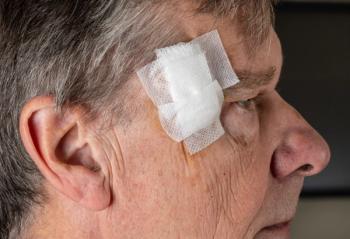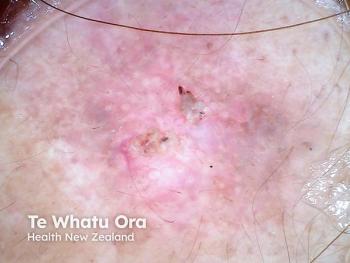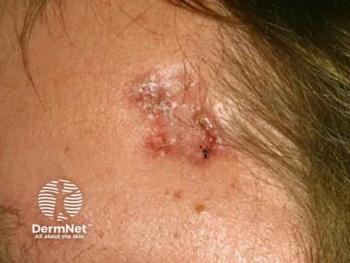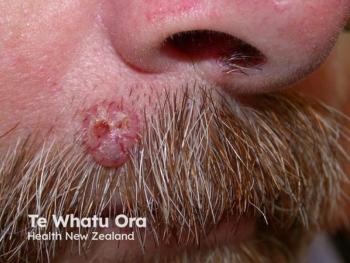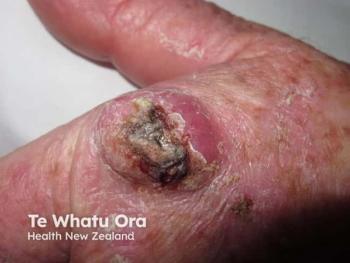
AAD Focused AK Update Recommends Topical Tirbanibulin
The AAD recently added topical tirbanibulin (Klisyri: Almirall) to its list of recommended therapies for treating AK.
The American Academy of Dermatology (AAD) recently added topical tirbanibulin (Klisyri: Almirall) to its list of recommended therapies for treating AK.1
AAD issued a focused update to its
The update, initiated because of the
They used the GRADE (Grading of Recommendations, Assessment, Development, and Evaluation) approach “for assessing the certainty of the evidence and formulating and grading clinical recommendations”.
Both trials were randomized, double-blind, parallel-group, and placebo-controlled. Each trial enrolled 351 patients. Using a 1:1 ratio, investigators randomly assigned adult patients with AK on their face or scalp to receive topical tirbanibulin or vehicle (placebo) ointment. The study authors explained that the standard regimen for tirbanibulin in both groups was application to a 25-cm2 contiguous areas containing 4 to 8 lesions once daily for 5 consecutive days.
Results of that study showed:
- At day 57, in trial 1, 44% of the patients in the tirbanibulin group (77 of 175) had complete clearance versus 5% of those (8 of 176) in the vehicle group (difference, 40 percentage points; 95% confidence interval [CI], 32 to 47; P<0.001), while, at the same point in trial 2, 54% of the patients who received tirbanibulin (97 of 178) achieved clear skin versus 13% (22 of 173) who received vehicle (difference, 40 percentage points; 95% confidence interval [CI], 32 to 47; P<0.001). That translated to pooled clearance rates of 49.3% (174 of 353) for the tirbanibulin-treated group versus 8.6% (30 of 349) for those treated with vehicle (risk ratio [RR] 6.14 95%CI 2.73, 13.80; p<0.0001).
- Patients in the tirbanibulin groups in trials also achieved “significantly higher” partial clearance than the vehicle group at day 57, according to the trial investigators. Participants who received tirbanibulin posted pooled partial clearance rates of 72.2% (255 of 353) versus 18.1% (63 of 349) for the vehicle group (RR 3.99 95%CI 3.16, 5.04, p<0.00001).
- At 12 months, they reported, “the estimated percentage of patients with recurrent lesions was 47% among patients who had had a complete response to tirbanibulin.”
- Erythema was the most common local reaction to tirbanibulin, affecting 91% of patients who received it, followed by flaking and scaling, which impacted 82%. Application-site pain topped the list of adverse effects (AEs)(10% of patients), with pruritus as a close second (9%). According to the authors, all of these reactions/AEs resolved. The AAD work group added that, “Severe local skin reactions were rare with lessthan 1% of tirbanibulin-treated participants experiencing severe vesiculation, pustulation, erosion, or ulceration by day 57 and no vehicle-treated participants experiencing these severereactions. No participants in either arm of the trials discontinued treatment due to treatment-related AEs.”
In its “rationale for recommendation,” the work group “determined that the overall balance of benefits and potential harms as reported at 57 days favors using tirbanibulin for the management of AK on the face and scalp and that the certainty of short-term evidence is high.”
However, the group also noted that the medication may be cost-prohibitive “without adequate insurance” and that other strongly recommended AK treatments may provide lower-cost alternatives.
In its executive summary, the group wrote, “Tirbanibulin is likely acceptable to patients and providers, and feasible to implement especially considering the abbreviated duration of tirbanibulin treatment compares to the duration of other available topical agents for AK.” They added the caution that the current recommendation is based on currently available, short-term evidence specifically for managing AKs on the face and scalp, and that future, longer-term safety data “may impact the direction or strength of the recommendation.”
Disclosure
The American Academy of Dermatology funded the guideline update based on the trial data with internal funds.
References
- Eisen DB, Dellavalle RP, Frazer-Green L, Schlesinger TE, Shive M, Wu PA. Focused update to the Guidelines of care for the management of actinic keratosis: Executive summary, J. Am. Acad. Dermatol. (2022), doi:
https://doi.org/10.1016/j.jaad.2022.04.013 . - Eisen DB, Asgari MM, Bennett DD, et al. Guidelines of care for the management of actinic keratosis. J Am Acad Dermatol. 2021;85(4):e209-e233.
- Almirall announces FDA approval of Klisyri (tirbanibulin), a new innovative topical treatment for actinic keratosis. News release. Almirall; December 15, 2020. Accessed December 15, 2020.
https://www.almirall.com/newsroom/news/almirall-announces-fda-approval-of-klisyri%C2%AE-tirbanibulin-a-new-innovative-topical-treatment-for-actinic-keratosis - Blauvelt A, Kempers S, Lain E, Schlesinger T, Tyring S, Forman S, Ablon G, Martin G, Wang H, Cutler DL, Fang J, Kwan MR; Phase 3 Tirbanibulin for Actinic Keratosis Group. Phase 3 Trials of Tirbanibulin Ointment for Actinic Keratosis. N Engl J Med. 2021 Feb 11;384(6):512-520. doi:10.1056/NEJMoa2024040
Newsletter
Like what you’re reading? Subscribe to Dermatology Times for weekly updates on therapies, innovations, and real-world practice tips.


